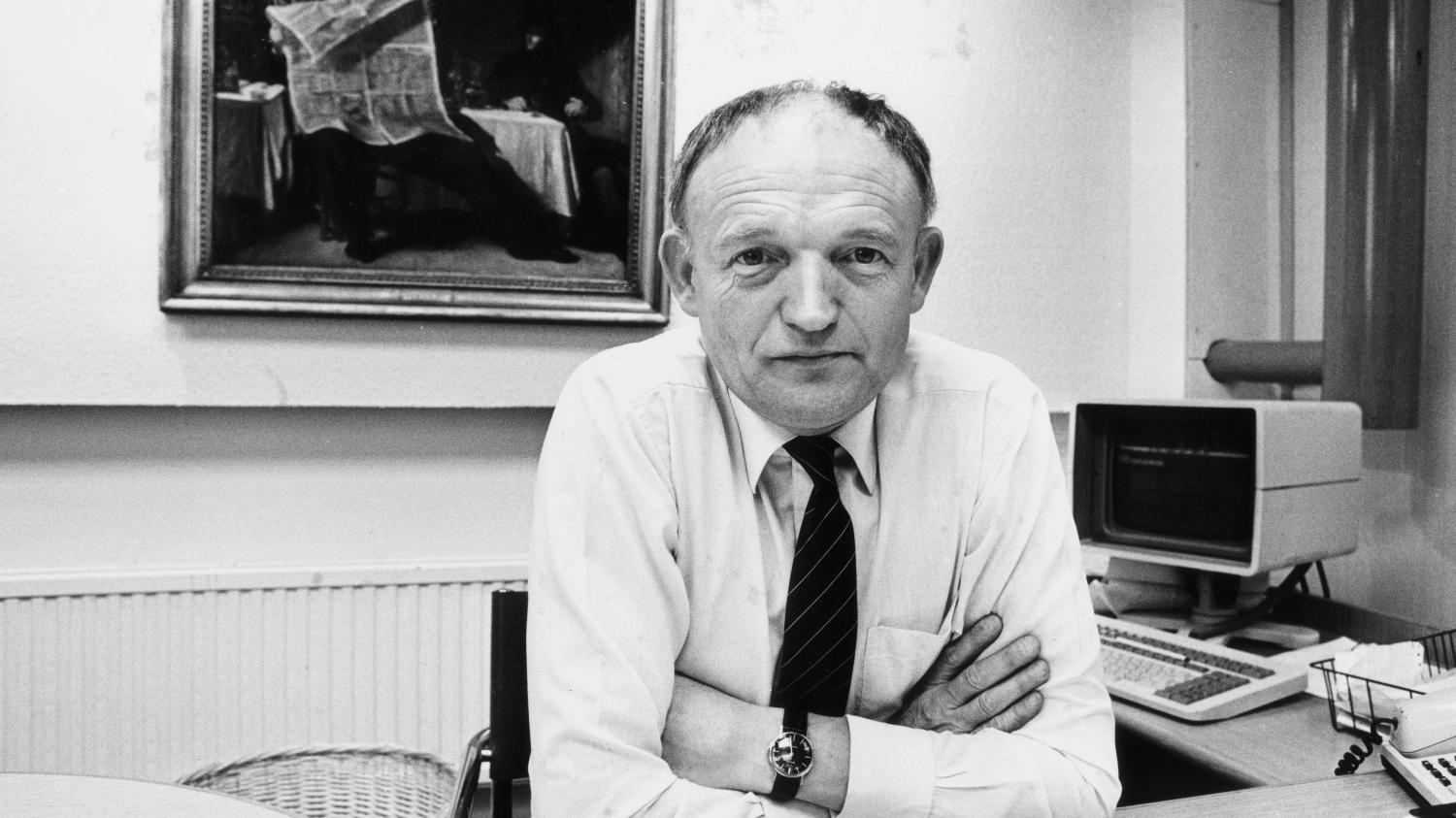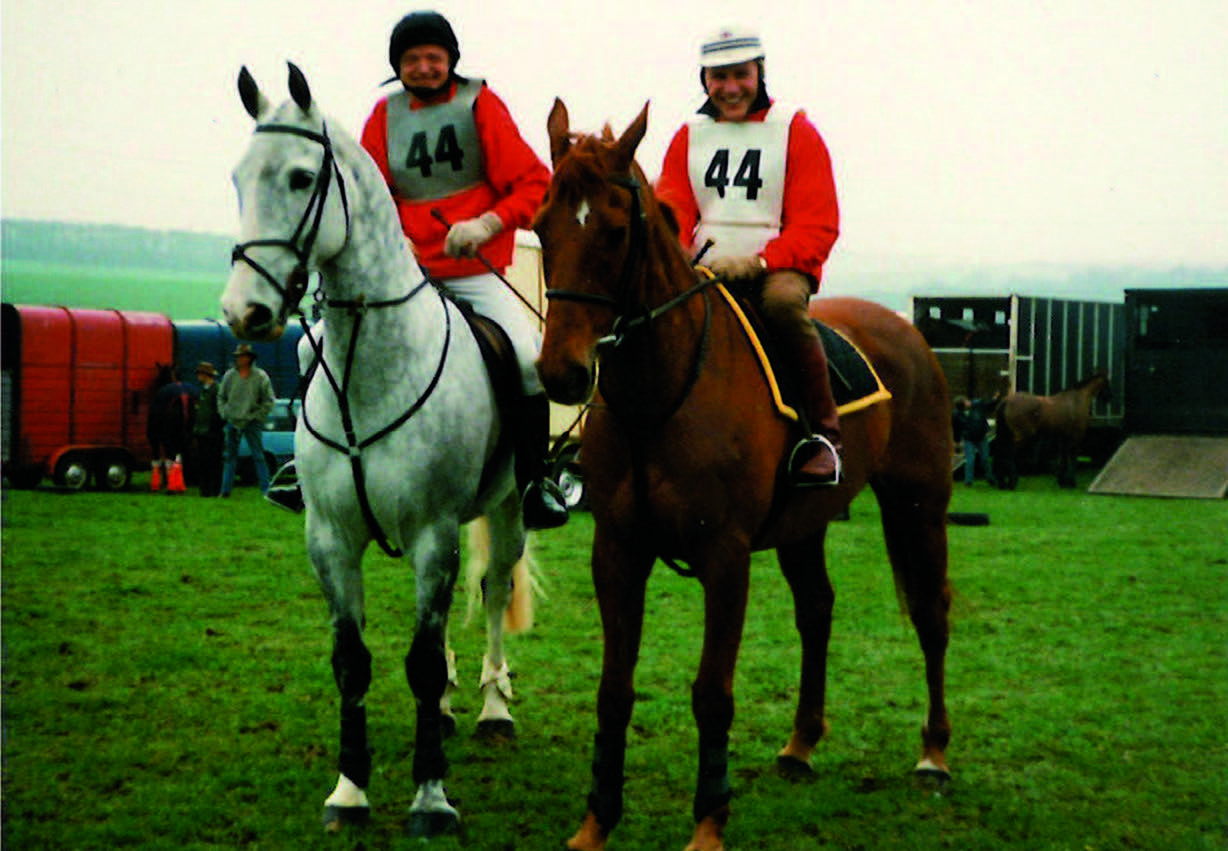As you have heard from Lily’s reading and you can see from these pictures in the Order Of Service, Charlie loved horses and the thrill of being in the saddle. But there was a snag – to quote Emma exactly – “he was a truly, catastrophically bad rider.”
Not surprising really because he didn’t start until his 50s, and because all that irrepressible Royal Marine, boxing champion fearlessness with which he had carved his way through life was never in any way matched with any proper competence as a horseman.
He started in Hyde Park, taken there for riding lessons every morning by his chauffeur “Flapper” Yates before he went on to spend the rest of the day editing The Times in Wapping. By the way was “Flapper” nicknamed not for any dodginess of temperament, but because his bat-like ears had stuck out under his helmet in his previous role as a jockey.
There were assorted disasters in the Royal Parks and things didn’t really look up until Charlie got an enormous grey, former Household Cavalry drum horse called Fortune, used to voice commands from furious sergeant majors, a skill set to which our hero was not totally unfamiliar.
He was really saved by four mentors. The ever-generous David Reynold took Charlie under his wing with the Woodland Pytchley, as did Charlie’s brother-in-law Mike Connell Connell, a distinguished judge, top rider and long- time Master of the Grafton. Mike and David did their best, albeit often able to do little more than shout “brakes Charlie, brakes” as C Wilson rocketed by.
On the horse side, Mel The Cob and Cheeky, the big grey in the pictures, did their best too and the long series of knocks and spills were almost entirely down to pilot error. What’s so impressive is that all these blows only made Charlie all the keener. This world became his happy place and one in which, as in his journalist existence, his kindness to those in unluckier times has many examples.
Not least to Steve Smith Eccles, the famous jockey riding alongside him in the picture. Steve, the miner’s son from Nottingham, won three Champion Hurdles on the track. But he is probably equally famous for the night his girlfriend threw him out of their Aintree hotel bedroom leaving Steve, unwisely, to opt for sleeping in the back of the car only to wake up speeding down the M6 with the thief at the wheel.
We are not quite sure how Charlie’s Glasgow childhood spawned a love of the horse, but the link with racing and particularly with betting is easier to explain. What better mental challenge to one of his tireless optimism than racing’s eternal battle of hope against expectation?
Of course there were some triumphs, most notably Grand National success with Papillon which he had backed at 50-1. But there were plenty of stumers amongst them Foinavon’s Grand National, the scene, would you believe it, of his and Annie’s first ever date.
He was always something of a frustrated jockey and it was no surprise to hear that the Wilson sofa had to be re- covered several times to patch up the whackings it got from Charlie’s whip as he rode a finish watching races on the telly.
If he couldn’t watch, listening to the results on radio was crucial. On the afternoon of his first wedding, that was 19th January 1968, Annie Robinson, en-route with him to the delights of Gravetyre Manor, was confused to find that the car, and Tommy the chauffeur lent them by Mail editor Arthur Brittenden, appeared to be making its fourth or fifth circuit of the East Grinstead one way system.
Tommy and Charlie were stalling to hear the results of the 4.30 from Nottingham.
So, and we are back in June 1967, I strongly suspect that Charlie was moonlighting to pay off gambling debts when he first gave me a call to write a piece for the magazine he was editing on the side. It was called – “The British Bookmaker.”
Racing never lost out when he was involved. He was the best friend we ever had in newspapers. What fun he got when his role at the Mirror saw him supremo of the Sporting Life. Naturally he revived the Daily Mirror Punters Club and earlier, when The Times had moved to Wapping, Charlie’s idea of a team building exercise was to get a horse. Racing correspondent Richard Evans was commissioned to head a syndicate, bring in aces like Tom Clarke, Robin Oakley and Phil Webster, buy a horse to which they called Sunday For Monday.
Sunday For Monday’s name was about the best thing you could say about him, save perhaps that for that of his mother. His dam was called Gin And Tonic. But the second syndicate horse, Northern Saddler, was a star who won 6 races. And you need to know that all the time Charlie was also buying secret shares in other syndicates.
One of these horses was called “Nag Nag Nag” – named by Clement Freud with the idea that when Sally heard Charlie saying “Nag Nag Nag” on the phone she would think he was complaining about her rather than how much to put on Nag Nag Nag, the horse, next afternoon at Lingfield.
And there was another syndicate horse Sally didn’t even know about until I told her last Friday. It won 7 races including one at Cheltenham and had been named especially for the phrase Charlie habitually used when entering these clandestine arrangements. It was called “Don’t Tell The Wife”.
The form book suggests that Charlie can’t always have been the easiest of husbands, but he seems to have been a super Dad. There are some lovely photos of him and Emma pony trekking in the Welsh Mountains, others with Lily at her winner-fest gymkhanas, and the crazy images of Charlie and his camcorder astride the roofs of cricket pavilions filming Luke at the crease.
How fitting it was that his final chapter was to bring horses and racing even closer together. He was able to watch Rachel win five races in the those red with a white stripe silks you see up beside the altar and, even better, he was able to watch horses they had bred at home in Leicestershire race and win over jumps
To be fair some of them were pretty useless and the first try was a total horror show. The horse, Bowden Vulcan, nearly killed his jockey in the paddock, bolted to the start and was never run again.
The jockey, Nick Pearce, mercifully survived this ordeal to be here today and must also have earned a nomination for being the politest man in Britain. For a couple of weeks ago Rachel found an envelope in which was – of all things – a letter from Nick thanking Charlie for the ride on the appalling Bowden Vulcan
But things got better. Delgany Demon, the foal in this picture on the Order Of Service, won three races, and Delgany Gunner won six. There are now two good young ones soon to run but a couple of years ago with nothing ready to race, Charlie and Rachel leased a mare from trainer Dan Skelton.
Three times she won for them over hurdles and then – brilliantly – on August 18th last year – Charlie’s 87th birthday – just a fortnight before he died – she made all the running to win a 3 mile chase at Fontwell.
By then Charlie was not up to much whacking of sofas – but got great pleasure in watching the replays and talking to Dan Skelton about future plans.
And it’s a nice thought that the mare’s name symbolised much of the way with which Charlie blazed his way through life.. She was called – Dazzling Glory.
Yes, Charlie Wilson may have been a catastrophically bad rider but, as so many of us were lucky enough to know, he was also a really terrific man.
And I would like to close by saying how touched I am to be standing here. For Charlie’s calls, that first from the British Bookmaker in 1967, and the second in 1971, were very important to me.
The first was for the last thing I wrote before turning professional after which the Jockey Club, banned me from writing for newspapers as I might, quotes, “give away stable secrets”. The response, that in which case I would not remain stable jockey for very long, was dismissed as impertinence.
Charlie’s second call, he was then on the Daily Mail, was rather more important. For it was the first commission I got after my not too “Dazzlingly Glorious” professional career had come to a crashing halt at the second last at Warwick.
I owe Charlie for that. For at a difficult time he gave me – as he gave to so many others – the belief that anything is possible.



 Charlie and Steve Eccles at the Grafton Team Chase
Charlie and Steve Eccles at the Grafton Team Chase